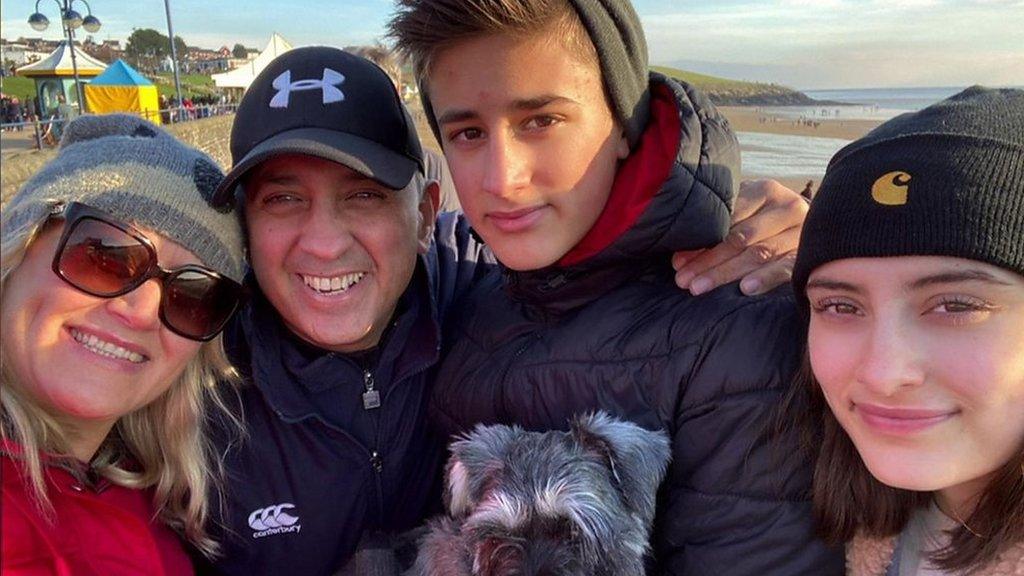Coronavirus: Family's heartbreak over life support dad
- Published
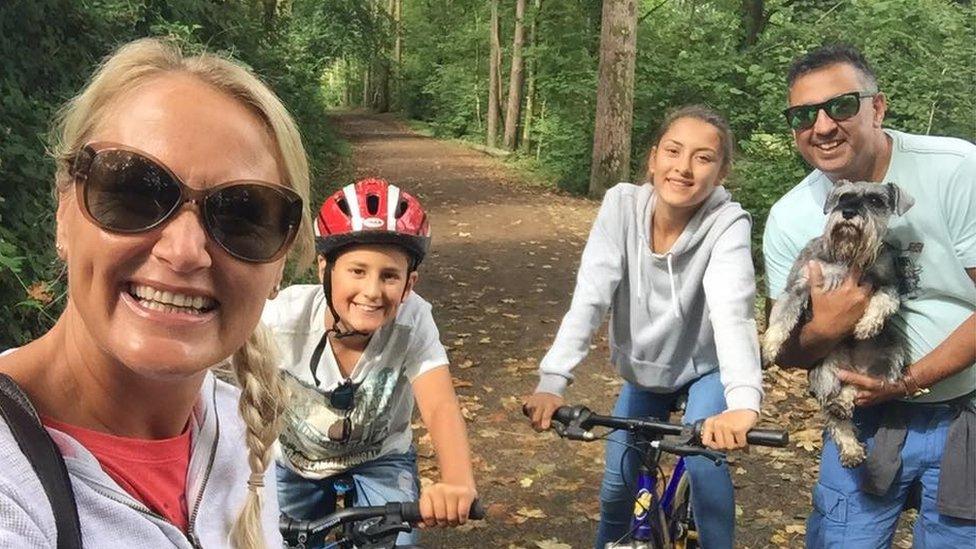
Sue Martin said family photos had been placed around her husband Mal's intensive care bed
Behind the statistics and news reports, what is the reality for families with loved ones critically ill with Covid-19? Sue Martin, a 49-year-old civil servant, tells Ceri Jackson of the daily heartache of her ordeal and that of her teenage children since her husband Mal, 58, was admitted to intensive care.
The hospital consultant phoned me yesterday and asked me if I'd like to send him some photographs of my husband with his family.
He suggested getting them laminated and placed around his intensive care bed. He looks peaceful, like he's sleeping, but a ventilator is the only thing keeping him alive.
"It can be dehumanising," the consultant said, and besides, it would help the medical staff know a little more of the person they were nursing.
Hopefully the photos we've selected will give a glimpse of the man they are caring for in what could be his final hours.
Sue and children Wiliam and Hana were able to spend ten minutes with Mal to say their goodbyes
I wish I could be there to tell them what Mal Martin's really like. How despite family tragedies and hardships we were happy after 28 years of married life; how he is loved by so many; that he's always the first to get on the dance floor; that his party piece was a rousing rendition of 'King of the Road'; that all he'd ever talk about was our two children, the eldest of whom we nearly lost in childbirth and the youngest who was miraculously conceived after we'd been told we had no hope of having a second child.
I'd tell them of his passion for Welsh rugby and that our son Wiliam, 13, never finishes a practice or a Cowbridge RFC under-14s game without his dad glued to the side-lines. Or of his pride at our daughter Hana, 16, a successful TikTok creative with a world-wide following. Our miracle kids; all the heartache had been worth it.
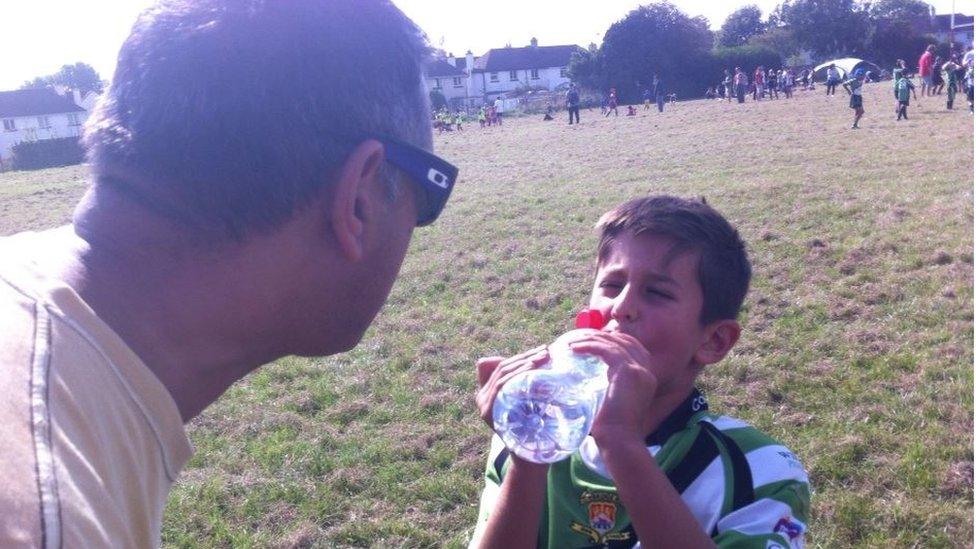
Mal supporting his son Wiliam playing rugby
Instead, I struggle to get through another day, re-playing the living nightmare of the past 11 days over and over in my mind.
The day before Boris Johnson announced the 'lockdown' Mal had complained of feeling unwell. He felt he was coming down with a cold. "I just don't feel right," he'd said.
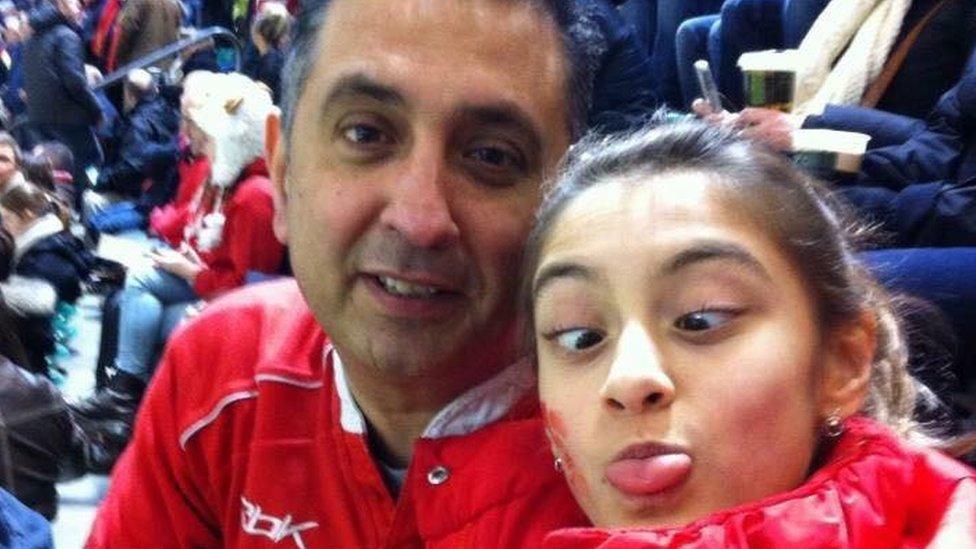
Mal with his daughter Hana watching Wales play rugby
He'd been to work for a few hours that day. The staff at his recruitment company are like family to him and he was trying to figure out how he could protect their jobs through the coronavirus crisis by organising laptops so they could work from home.
He went to bed that night to sleep it off. The next morning - it was so sudden - he couldn't get out of bed. All the classic symptoms of Covid-19; a sudden cough, really high temperature, achy and shivering so much so that it hurt.
From that day he isolated in the one room. Except for using the bathroom, he didn't get out of bed. I would take him drinks, food and paracetamol, constantly monitoring his temperature.
He told me he'd never felt this ill in his life. "When is this going to get better? I can't take much more of this," he said. I tried to reassure him that from what I'd read he'd start to feel a bit better after day five.
His temperature would fluctuate; it would normalise and I'd comfort myself that he'd turned a corner but then it would go up again and down again…
By the time he went into hospital his temperature was normal.
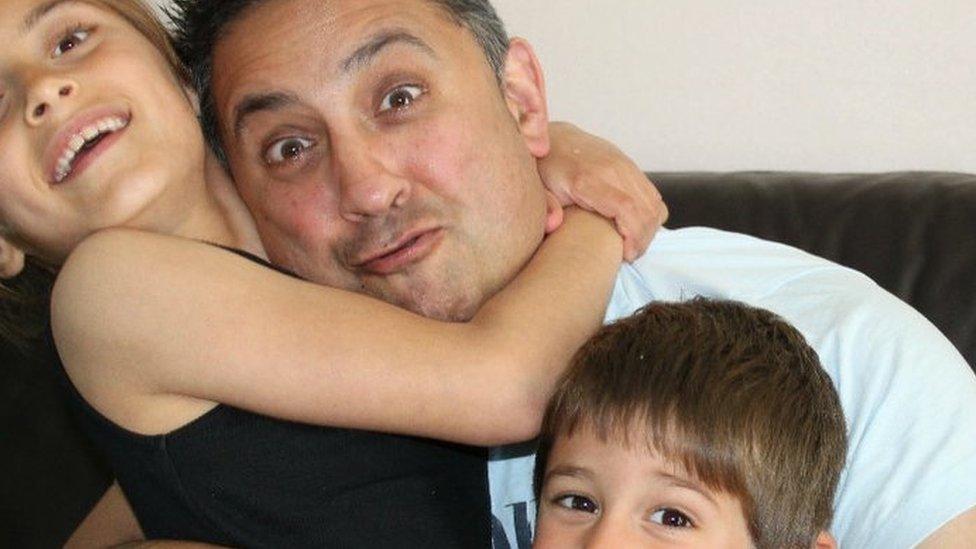
Sue and the children were able to Facetime Mal when he first got admitted to hospital
On day seven he seemed to be getting worse. I rang 111 and twice I was on hold for an hour and 22 minutes - that's the maximum hold time - before getting cut off. I know that they were inundated.
I rang the GP surgery and our doctor did a telephone appointment with him. She instructed me on how to take his pulse and how to monitor his breathing rate.
She'd spoken to a hospital consultant who said he too was happy for him to stay at home and to monitor and report any deterioration. She, like others have been wonderful, ringing every day to firstly check on Mal, and now me.
By the next morning, Sunday, his breathing rate had really escalated. I rang 999. He was weak but managed to walk to the ambulance.
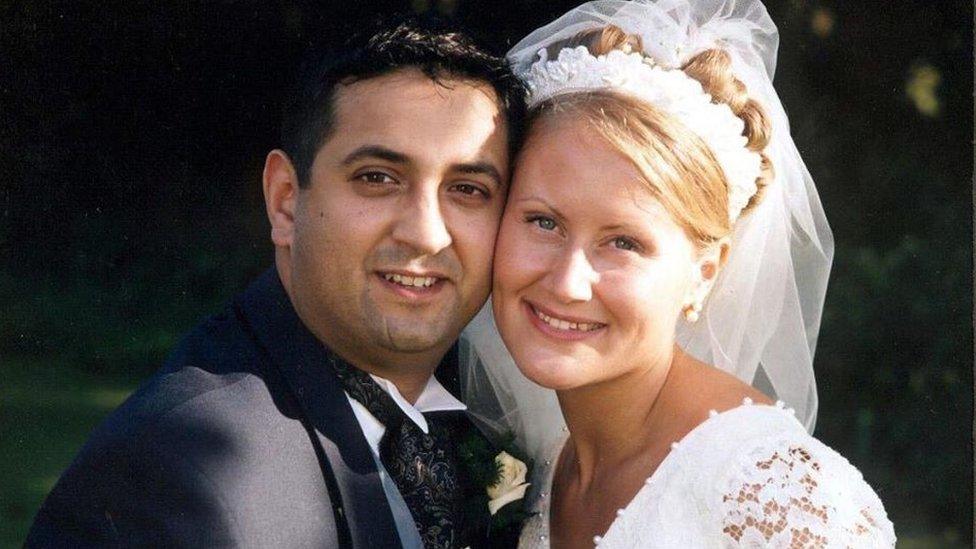
Sue said her "legs went from under her" when she heard Mal was going to be ventilated in intensive care
I didn't know where they'd taken him until a nurse from the Princess of Wales Hospital in Bridgend phoned me. Mal was desperately ill she said and he needed to go straight to intensive care to be ventilated. My legs went from under me.
How did I not know he was so desperately ill? She reassured me that she'd seen the notes and that I'd done "above and beyond" and that his deterioration, so common with Covid-19, was rapid and there was nothing anyone could have done.
She said Mal had asked her to ring me because he was too upset to talk; they'd explained to him that they are going to have to put him to sleep and that he might not wake up.
Me and the kids Facetimed him. We told him how much we loved him and that he had to get well; we wanted him back home. He said to Hana "don't' worry, I'm going to be around for a while yet. I'm going to be at your wedding to give you away".
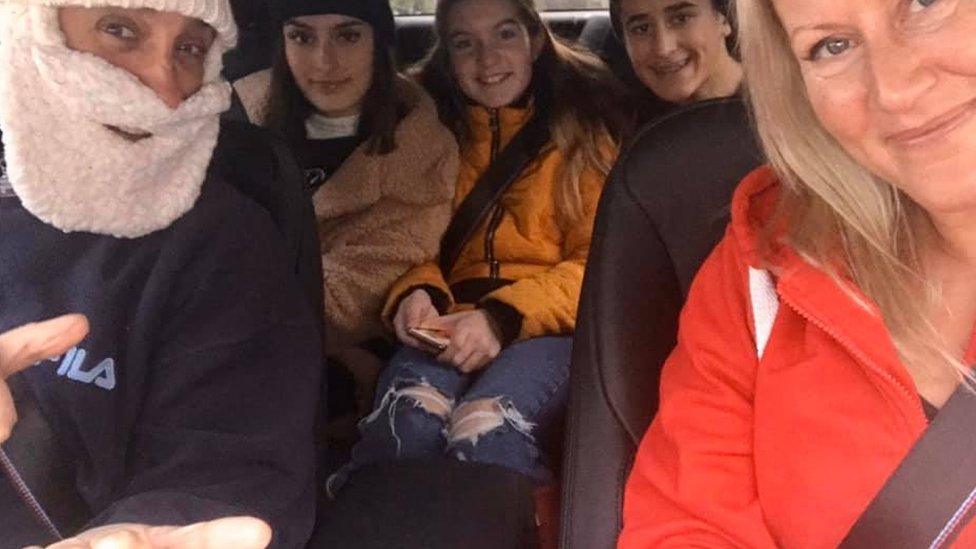
Mal had a heart attack four years ago and is diabetic
Then he said "I've got to go now. They're taking me in".
We messaged one another after that. I text that I missed him already and he replied "I miss you too. I know it's not my time. I promise you I'm going to fight this". I text back "I'm really sorry I tried to force-feed you Weetabix". For days I'd been desperately trying to feed him, to get his strength up. His last text to me was: "Ha ha. That's what's done it."
After that my messages weren't going through. I knew then they'd taken him to intensive care.
After a couple of days there was a little bit of improvement and they reduced the oxygen slightly. We'd been warned that the odds of a patient surviving ventilation was 50/50 but we were hopeful.
Mal is diabetic, which is genetic, not life-style related. Four years ago he'd had a heart attack while watching Wiliam play in a rugby tournament and had three stents fitted. He recovered well, did park runs regularly and never drank heavily or smoked. Doctors reassured us that his diabetes was controlled and that he was fit and healthy.
But one of the daily phone calls brought the news we were dreading - he had deteriorated, the consultant explained, they'd had to put the oxygen back up. They were concerned about his kidneys and his arteries, his hands were cold.
They tried lying him on his stomach to help his lungs but it made no difference. They hooked him up to a dialysis machine; his kidneys had failed.
On Sunday - day seven in hospital - the consultant prepared me for the worst; Mal was on the maximum amount of adrenaline they could give him in order to keep his blood pressure high enough to pump enough blood around to sustain his organs. He was at the brink and there was nothing further they could do for him.
The chance of his surviving, they told me, was almost zero.
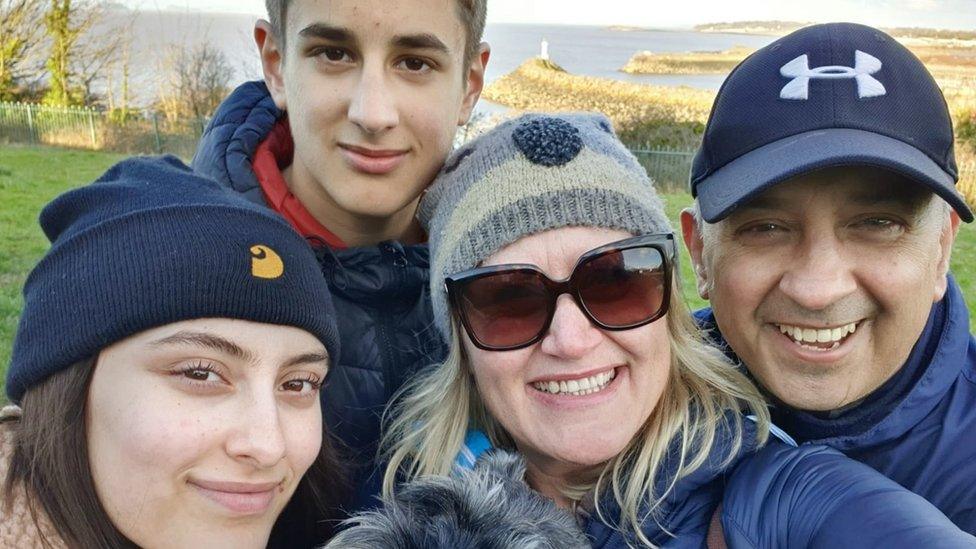
After 17 days, Sue and the children were allowed to visit Mal in hospital for 10 minutes but were not allowed to touch him
I begged them to let us see him. We'd all had mild symptoms of Covid-19 at the time Mal became ill. We were on day 17 now, we'd isolated for 14 days and doctors had told us we were now OK to leave the house. I pleaded with them to do whatever they could do.
The ward sister was about to go off shift. She spoke to the consultant and phoned me back. "How quickly can you get here?" she asked me. "I'll wait for you and take you in but you'll have to be in full protective gear, you can't touch him, you can only have 10 minutes. But you can speak to him."
She was exhausted after a full shift but stayed on for us. I can't describe how grateful I am to her.
We couldn't touch him but we could get close. He had so many tubes in him but he was peaceful, like I said, as if he was asleep. We told him that we loved him. It was heart-breaking for the children. To hear them say "we're going to make you proud dad" and "we'll look after mum". I said to them "but you've already made him proud".
I promised him that I'd continue to ring his dad every day which is something he always did.
At that point we thought we were saying our goodbyes. We thought Monday would be his last day.
On Monday then there was an ever so slight improvement. No improvement to his kidneys, lungs or arteries but his blood pressure had increased ever so slightly so they were able to slightly reduce the amount of adrenaline they were giving him so he's not quite on the max any more.
We don't know what to do with ourselves, we don't know how to feel. It is torture we feel like we're in a living in a nightmare. I've never known pain like it, like somebody's constantly stabbing me in the heart and twisting the knife.
I find it difficult to swallow food at the moment. We don't sleep, me and the kids cuddle up in the same bed and stay awake til the early hours watching DVDs of the kids when they were little so they can see their dad.
The first thing I think on waking is "OK, they haven't rung me through the night so he's still alive" and the wait starts for the daily phone call from the consultant. I keep the phone lines clear as I never know what time it's going to be. And when the phone rings it's sheer panic.
I can't see my parents which has been so hard on them to not be able to be with us, be with their grandchildren. It's so much harder to deal with this when you're isolated from friends and family but people have been so supportive, dropping shopping, meals, cakes and flowers and plants - anything to try to bring us comfort. One friend drove an hour just to sit two metres outside my door just to be with me.
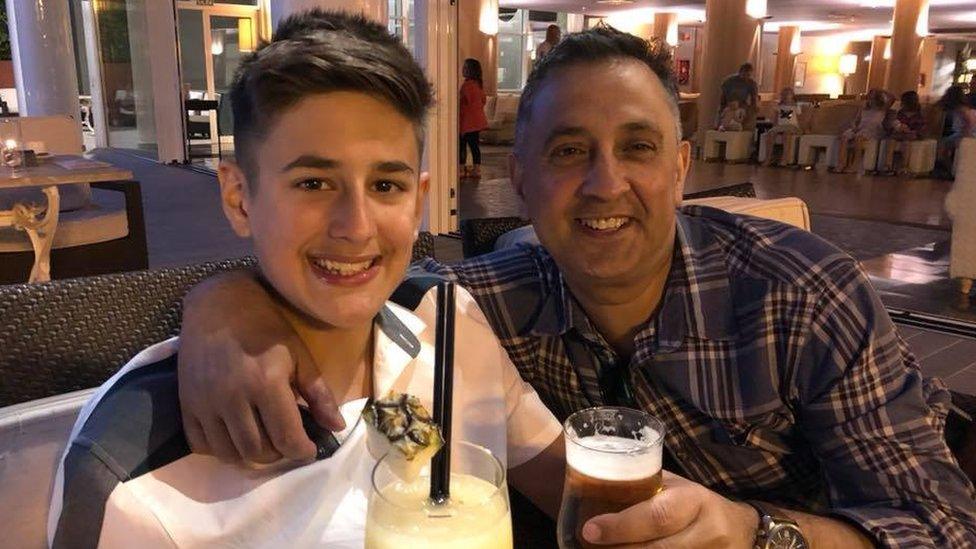
The hospital staff are "literally buying him some time to give his body a chance to recover from the virus"
Yesterday I got a message from a nurse who was with him when he first went into hospital before he went to ICU. She said she remembered him and he was talking about how proud he was of his kids.
That brought me some comfort because what's been haunting me most is those couple of hours that he was in there knowing what was going to happen and us not being able to be there, thinking how scared he must have been.
They're literally buying him some time to give his body a chance to recover from the virus. There's nothing else they can give him. All they can do is give him time.
I'm so, so grateful for all the hospital are trying to do for him, risking their lives to try to save his. They have been wonderfully supportive, compassionate and empathetic in such difficult times.
I just want people to think. If me talking about our experience stops one or two people going out, it could save another life. You don't know how you will be devastated until it happens. Just don't take the risk. If you come through this crisis and everybody around your table is still there then you're incredibly lucky.
Nothing is worth sacrificing a loved one's life or the life of hospital worker for. For the sake of going for a bike ride with friends, or going out because your partner's irritating you… one moment that might relieve a bit of boredom could completely turn your life upside down.
I don't want Mal to be just another statistic. I want people to know him and know how amazing a man he is.
The photos here and the laminated ones around his hospital bed are our only way of saying he is the best and that our hearts are breaking over and over and over.
- Published9 April 2020
